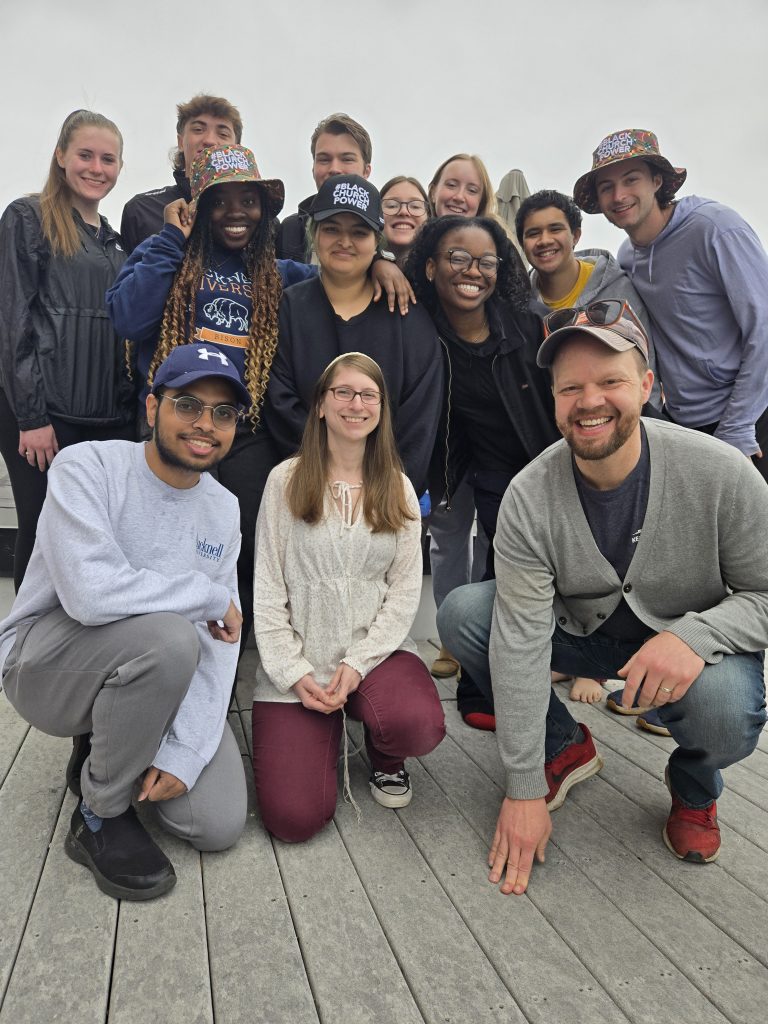Dora Kreitzer ’25
This course has 3.5 core questions: Why are people food insecure in 2025? How are communities responding? Where do we fit? And our half question: what gives you hope? The reason it’s a half, as Kurt explained in one of our early sessions, is that we’re not sure hope is the right word or feeling to be focusing on in this landscape. But then this week, hope was a big point of discussion with many of our partners, especially in terms of how they are feeling about this political moment.
It started with Reverend Heber Brown, who shared that despite the chaos coming from Washington D.C., he feels optimistic. He has studied historical movements, knows that communities have responded and come together to surmount oppressive challenges in the past, and sees that network and his role in it today. Dr. Brown also talked about one of the goals of this current administration being to make people feel discouraged and despair; whether or not policies are actually imposed doesn’t seem to matter as just making headlines that make people feel the situation is hopeless. Optimism, therefore, is an act of resistance. Dr. Brown isn’t ignorantly hopeful, sticking his head in the sand and hoping that when he lifts it back up things will be okay. To face contemporary challenges head on, to build community, to see new networks growing and food distribution systems changing, and to see patterns and cycles of history showing how people push back all give him reason to be hopeful. Dr. Brown proved to me that one can engage with all of the political volatility of this moment, and still be optimistic about our country and about the future, because he is finding community and taking action which shows that efforts are still worth it.

Then, Terris King said he was actually excited about how his work could grow because of changes at the federal level, including the possibility of eliminating the Department of Education. For the last three years, King has been developing Temple X schools, which is creating a forest school model for Baltimore city, and has recently expanded to seven states. With the entire landscape of education changing, King sees an opportunity for more people to opt in to models that actually suit children better, such as Temple X, which gets kids connected with nature and gives them opportunity to play. Once again, King’s optimism did not come from hiding, but from recognizing positive potentials in all that is up in the air to transform. If things are changing radically, there is room for them to change for the better. Not only that, but King noted that he already didn’t like the system of White supremacy before, and the current administration’s version is just a more visible level of it. If it’s calling more people into action, that could be a good thing.
Optimism was a matter of discussion again with Andrea Faiano from Bread for the World. Working on the organizing team for Bread, Faiano already spent a lot of her time thinking about national politics, and that has become all the more challenging because of the current political climate. Having worked in Congress for more than 50 years, Bread for the World knows the political process, and is used to working slowly and as a bipartisan organization. But, the speed at which the current administration is working and the way some senators and representatives are hiding has made their work more complicated. Despite that, Faiano continues to do this work because she is hopeful ultimately that she can make a difference. Faiano is dedicated to the Modern WIC Act, and believes that if she focuses her energy there, there can be real movement on keeping WIC processes online and accessible. Focusing on what is in her control, with a specific goal, has helped to keep Faiano hopeful about the role that she and Bread for the World can have in reducing hunger in the United States.
As for me, I came into this week hopeful about our work certainly, but discouraged by national politics, and unsure of where, how, and if I fit into resistance. But, this week made me optimistic. Hearing from so many people feeling hope right now, it was impossible for none of it to be contagious. Not only that, but watching our cohort of 13 get engaged, find methods of response that resonate with us, build a supportive community that we all know we can fall back on, and deeply discuss how we plan to move forward gave me reason to be optimistic. We are only 13 people, but there is so much each of us can do. Like Brown, King, and Faiano, my hope comes from seeing people do the work, and now seeing that there is more of it I can be doing, too. I can’t change who is in office, but I can build protective communities, advocate for and create change at the local level, and after our DC day, maybe even feel confident enough to call my own elected officials about protections I feel passionate about. Optimism is resistance, and after this week, it is the path forward that I hope I can continue to channel. That is because of our amazing, example-setting community partners and all of the inspirational people I get to call classmates and friends as a result of this experience.